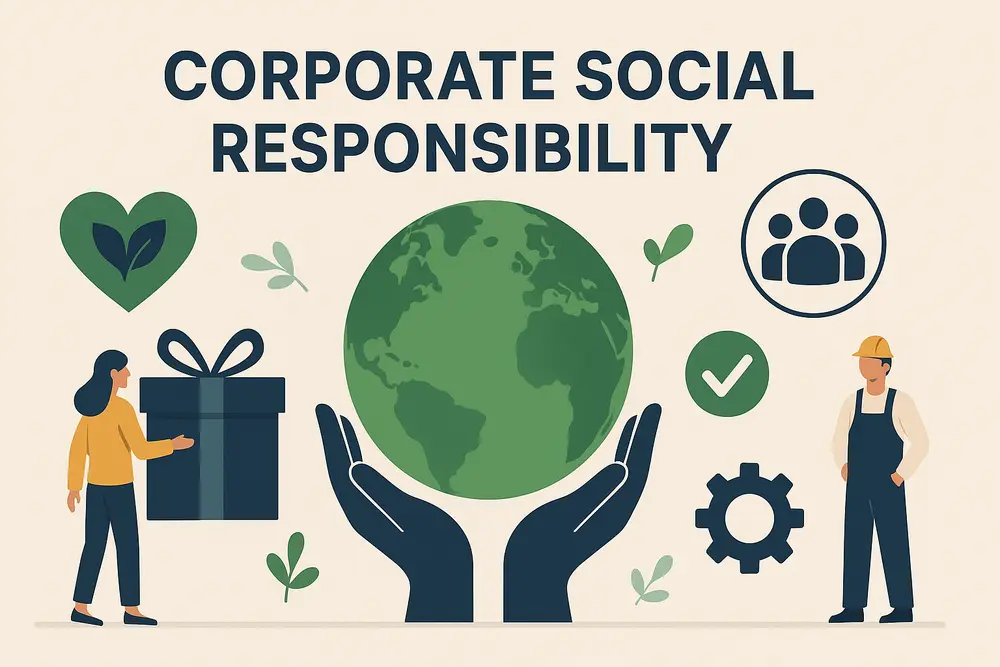What Role Does Corporate Social Responsibility Play in Shaping Modern Society?
Corporate Social Responsibility (CSR) is a self-regulating business model that encourages companies to be socially accountable—to themselves, their stakeholders, and the public.
Corporate Social Responsibility (CSR) plays a transformative role in shaping modern society by aligning business success with ethical, environmental, and social progress.
Corporate Social Responsibility has become a cornerstone of modern business strategy, bridging profitability with social welfare.
From environmental stewardship to ethical labor practices, CSR initiatives reflect a corporation’s commitment to the broader community.
The sociological study examines CSR’s multifaceted impact—how it reshapes societal norms, influences organizational culture, and drives sustainable development.
If we apply key sociological theories, we can uncover the mechanisms through which CSR contributes to social cohesion, economic equity, and cultural change.
Let’s explore how Corporate Social Responsibility (CSR) shapes communities, institutions, and individual well‑being through a sociological lens, with insights into theory, practice, and future trends.

Understanding Corporate Social Responsibility
Corporate Social Responsibility (CSR) refers to the voluntary integration of social and environmental concerns into a company’s operations and stakeholder interactions.
Unlike mandatory regulatory compliance, CSR programs—such as philanthropic giving, ethical sourcing, and green manufacturing—are driven by corporate values and stakeholder expectations.
From a sociological perspective, CSR functions as a form of “normative regulation,” where businesses internalize societal values and broadcast them through their practices, thereby reinforcing or reshaping prevailing moral standards.
This dynamic fosters a reciprocal relationship: companies cultivate public trust and brand legitimacy while communities benefit from resources, improved infrastructures, and enhanced social services.
Crucially, CSR also serves as a mechanism of social integration, aligning corporate goals with collective well‑being and signaling to employees and consumers that business success and social progress are interdependent.
Corporate Social Responsibility embeds societal concerns into corporate strategy, and advances not only philanthropic objectives but also long‑term institutional resilience and social capital accumulation.
Sociological Theories Underpinning CSR
Sociological inquiry into Corporate Social Responsibility draws on several theoretical frameworks.
Functionalist theory views CSR as a stabilizing force that helps maintain social order: by addressing societal needs—such as poverty alleviation or environmental protection—corporations contribute to the smooth functioning of communities.
Conflict theory, by contrast, emphasizes power dynamics and potential co-option: CSR may be instrumentalized to legitimize corporate dominance or divert attention from exploitative practices.
Symbolic interactionism highlights the role of CSR in shaping corporate identity and stakeholder perceptions through everyday practices and communications.
The notions of social capital underscore CSR’s capacity to build networks of trust among firms, governments, and civil society.
These theories collectively illuminate how CSR initiatives both reflect and influence societal structures, as corporations navigate expectations, negotiate legitimacy, and reconstruct norms through strategic social engagement.
Understanding these frameworks is essential to critically assessing CSR’s potential to promote equity, solidarity, and sustainable change.
How Corporate Social Responsibility Drives Ethical Business Practices
Corporate Social Responsibility plays a pivotal role in driving ethical business practices by encouraging companies to operate with integrity, transparency, and accountability. It goes beyond profit-making to consider the broader impact of corporate actions on society, the environment, and stakeholders.
Through CSR, businesses commit to fair labor practices, respect for human rights, anti-corruption measures, and responsible governance. This ethical framework fosters trust among consumers, employees, investors, and communities, enhancing brand reputation and long-term loyalty.
CSR also influences internal culture by promoting values such as inclusivity, diversity, and social justice.
Companies that prioritize ethics often attract top talent and build resilient teams motivated by purpose.
CSR initiatives encourage businesses to engage in honest marketing, ethical sourcing, and sustainable supply chains, reducing exploitation and environmental harm.
In a globalized world, where consumers increasingly demand accountability, CSR serves as a strategic tool for aligning business success with societal well-being—proving that ethical conduct is not just morally right but economically smart.
The Impact of Corporate Social Responsibility on Community Development
Corporate Social Responsibility programs often target community development through initiatives in education, healthcare, and infrastructure.
Corporations fund schools or vocational training centers, and help upskill local populations, enabling social mobility and economic diversification.
Investments in clinics, sanitation projects, and clean water systems improve public health, reduce disease burdens, and enhance labor productivity.
Infrastructure projects—roads, energy grids, and digital connectivity—accelerate regional development, linking marginalized areas to broader markets.
Sociologically, these interventions strengthen social cohesion by fostering collaboration between businesses, local governments, and grassroots organizations. They also generate new forms of social capital: community members develop mutual trust and collective efficacy as they engage in planning and implementation. However, the depth of these impacts depends on stakeholder inclusion.
Genuine community participation ensures that CSR projects align with local priorities, while top‑down approaches risk reinforcing inequality or creating dependency.
Thus, sustainable community development requires integrating local knowledge, transparent governance, and continuous dialogue between corporations and community actors.
The Effects of Corporate Social Responsibility on Employee Well‑Being and Organizational Culture
Corporate social responsibility initiatives profoundly shape internal organizational dynamics. Programs like fair wages, safe working conditions, and diversity and inclusion training signal that a company values employee welfare beyond mere productivity.
Sociological research shows that when employees perceive genuine corporate commitment to social responsibility, job satisfaction, organizational commitment, and morale increase. This “psychological contract” fosters loyalty, reduces turnover, and enhances discretionary effort.
CSR also informs organizational culture: companies with strong social missions tend to cultivate collaborative, purpose‑driven climates where employees identify with broader societal goals.
From the lens of identity theory, this alignment between personal values and corporate ethos reinforces intrinsic motivation and ethical behavior.
Moreover, participatory CSR projects—such as employee volunteering and co‑design of community programs—build social networks within the firm, enhancing cohesion and trust.
Yet, superficial or inconsistent CSR can backfire: “greenwashing” or tokenistic initiatives may breed cynicism and erode internal credibility.
Therefore, authentic CSR integration requires consistent policies, participatory decision‑making, and transparent reporting to sustain positive organizational culture and employee well‑being.
Corporate Social Responsibility is a Catalyst for Environmental Stewardship
Corporate Social Responsibility plays a vital role in promoting environmental stewardship by encouraging businesses to adopt sustainable practices.
Companies are increasingly reducing their carbon footprints through energy-efficient operations, investing in renewable energy sources, and embracing circular economy models that minimize waste and maximize resource reuse.
These initiatives not only help mitigate the effects of climate change but also ensure long-term ecological balance.
By integrating sustainability into their core strategies, businesses contribute to preserving natural ecosystems and securing a healthier planet for future generations—demonstrating that profitability and environmental responsibility can go hand in hand.
Critiques and Limitations of CSR Initiatives
Despite its benefits, CSR faces significant critiques. From a structural standpoint, CSR can serve as a façade—allowing corporations to maintain profit‑maximizing behaviors while investing minimally in social welfare (“greenwashing”).
Critics argue that voluntary CSR lacks enforceable accountability, enabling firms to selectively disclose favorable outcomes and obscure negative externalities.
Conflict theorists highlight CSR’s potential to legitimize power imbalances: corporations may leverage social projects to secure political influence or access to resources, reinforcing existing hierarchies.
Unequal distribution of CSR benefits can exacerbate regional disparities: urban centers often attract more corporate attention than rural or marginalized communities.
Ethical debates question whether profit‑driven entities should bear social responsibilities traditionally managed by governments and civil society.
The efficacy of CSR is difficult to measure: disparate metrics, lack of standardized reporting frameworks, and varying stakeholder interests complicate assessments of social impact.
Addressing these limitations requires robust governance mechanisms, stakeholder accountability, and integration of CSR within broader regulatory and policy frameworks.
The Future of Corporate Social Responsibility and Societal Impact
Looking ahead, CSR is poised to evolve alongside global challenges such as climate change, social inequality, and digital transformation.
Sociologically, we expect greater emphasis on systemic interventions—partnerships that address root causes rather than symptoms.
Collaborative models, such as cross‑sector alliances and impact investing, will grow, leveraging shared resources and expertise.
Stakeholder capitalism frameworks—where investors, employees, and communities partake in corporate governance—may become mainstream, reshaping power relations within and between organizations.
The rise of digital platforms and data analytics offers new tools for measuring and reporting CSR outcomes with granularity, but also raises concerns about data privacy and equity.
Social movements and consumer activism will continue to pressure companies toward greater transparency and ethical consistency.
Ultimately, the next wave of CSR will require integrating sociological insights on norm change, social networks, and institutional dynamics to craft initiatives that are not only performative but transformative—fostering resilient societies and equitable futures.
Conclusion
Embracing Corporate Social Responsibility (CSR) as a strategic imperative enables companies to align profit goals with societal needs, fostering trust, resilience, and inclusive growth.
By integrating ethical practices across their operations, corporations contribute to social cohesion, community development, and environmental sustainability.
Sociological insights reveal that meaningful CSR initiatives strengthen stakeholder relations, enhance organizational culture, and drive systemic change.
To maximize impact, businesses must embed transparency, accountability, and collaboration into every program, ensuring that CSR efforts empower communities and address root challenges.
Ultimately, authentic commitment to CSR not only advances social progress but also secures long‑term value for both companies and society.
By championing stakeholder engagement, companies can truly create solutions that endure generations, fostering a more equitable future.





